外研版七年级上Module 8 Choosing presents 课件(languages points)(共11张PPT)
文档属性
| 名称 | 外研版七年级上Module 8 Choosing presents 课件(languages points)(共11张PPT) | 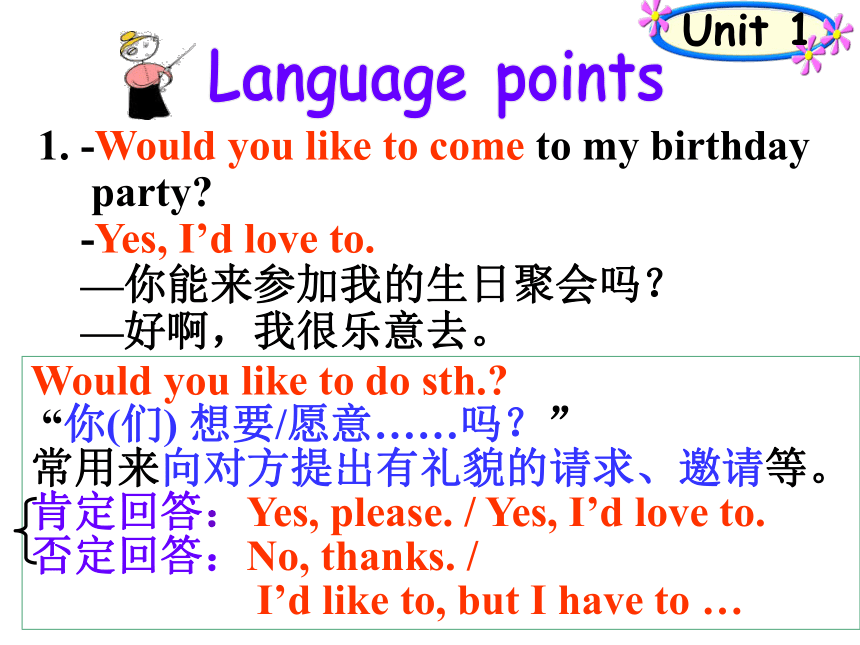 | |
| 格式 | pptx | ||
| 文件大小 | 217.1KB | ||
| 资源类型 | 教案 | ||
| 版本资源 | 外研版 | ||
| 科目 | 英语 | ||
| 更新时间 | 2022-10-12 18:24:14 | ||
图片预览

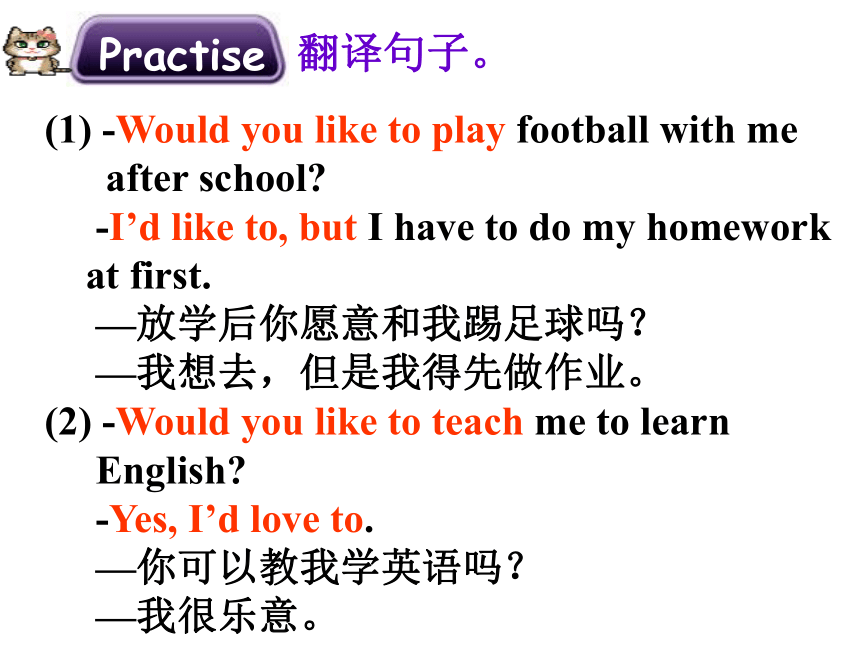
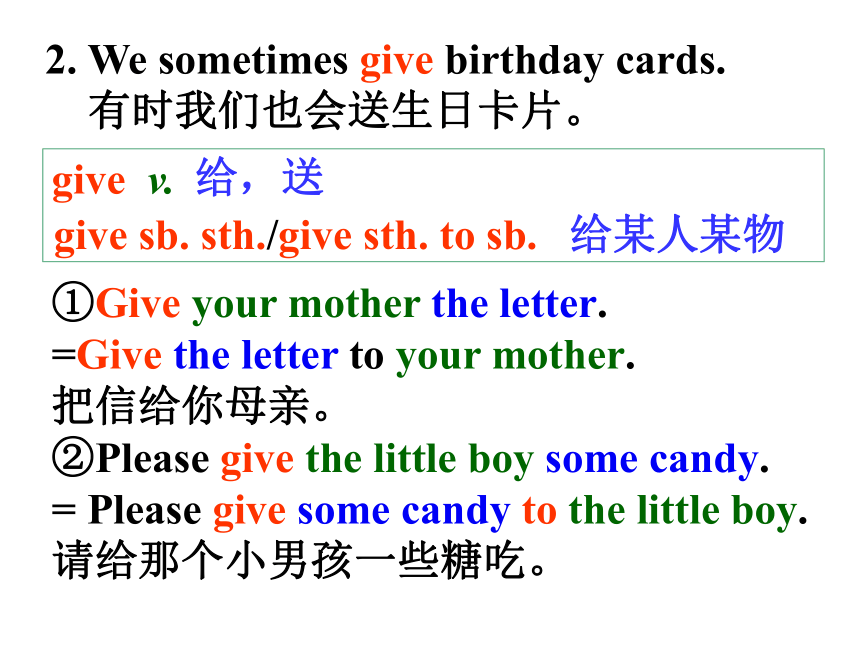
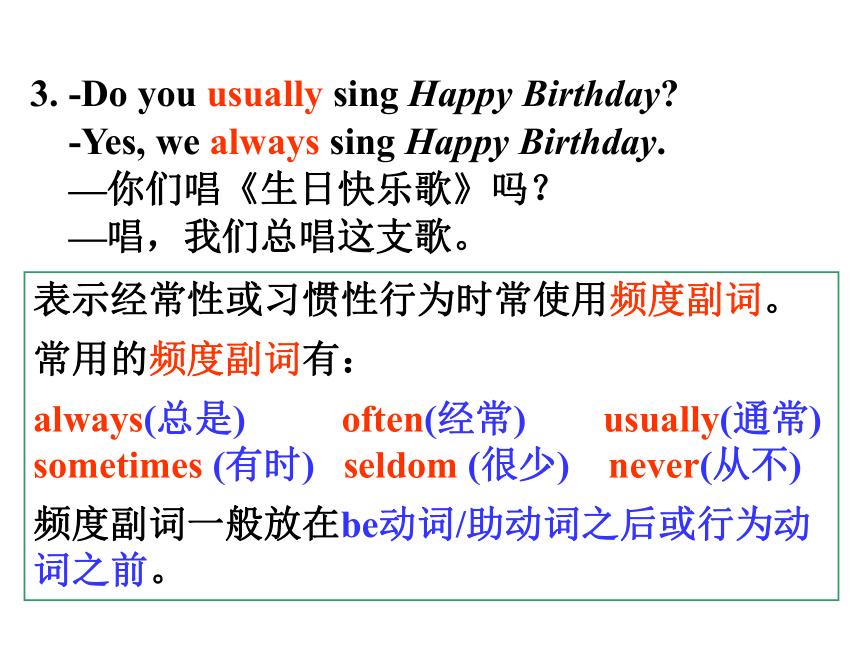
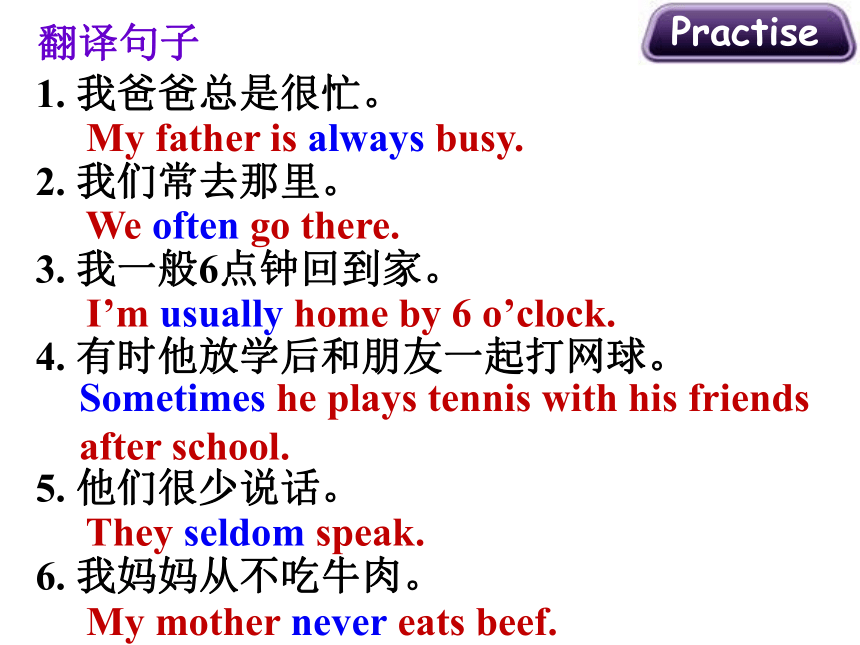
文档简介
(共11张PPT)
Language points
1. -Would you like to come to my birthday
party
-Yes, I’d love to.
—你能来参加我的生日聚会吗?
—好啊,我很乐意去。
Unit 1
Would you like to do sth.
“你(们) 想要/愿意……吗?”
常用来向对方提出有礼貌的请求、邀请等。
肯定回答:Yes, please. / Yes, I’d love to.
否定回答:No, thanks. /
I’d like to, but I have to …
(1) -Would you like to play football with me
after school
-I’d like to, but I have to do my homework
at first.
—放学后你愿意和我踢足球吗?
—我想去,但是我得先做作业。
(2) -Would you like to teach me to learn
English
-Yes, I’d love to.
—你可以教我学英语吗?
—我很乐意。
Practise
翻译句子。
①Give your mother the letter.
=Give the letter to your mother.
把信给你母亲。
②Please give the little boy some candy.
= Please give some candy to the little boy.
请给那个小男孩一些糖吃。
give v.
2. We sometimes give birthday cards.
有时我们也会送生日卡片。
give sb. sth./give sth. to sb. 给某人某物
给,送
3. -Do you usually sing Happy Birthday
-Yes, we always sing Happy Birthday.
—你们唱《生日快乐歌》吗?
—唱,我们总唱这支歌。
表示经常性或习惯性行为时常使用频度副词。
常用的频度副词有:
always(总是) often(经常) usually(通常) sometimes (有时) seldom (很少) never(从不)
频度副词一般放在be动词/助动词之后或行为动词之前。
Practise
1. 我爸爸总是很忙。
My father is always busy.
2. 我们常去那里。
We often go there.
3. 我一般6点钟回到家。
I’m usually home by 6 o’clock.
4. 有时他放学后和朋友一起打网球。
5. 他们很少说话。
They seldom speak.
6. 我妈妈从不吃牛肉。
My mother never eats beef.
翻译句子
Sometimes he plays tennis with his friends after school.
Language points
1. They sometimes wear T-shirts.
他们有时穿T恤衫。
wear v.
①My sister likes wearing sunglasses.
我姐姐喜欢戴墨镜。
②Do I have to wear a tie(领带)
我得系领带吗?
Unit 2
“穿,戴”,强调状态,即穿着什么衣服、鞋子或戴着什么帽子、眼镜、饰物等。
2. …so every day they get some exercise in a park near their home.
……所以他们每天都到附近的公园里锻炼。
exercise n[U]
① My parents usually take exercise after dinner.
我父母经常晚饭后锻炼身体。
②I don’t get much exercise these days.
这些天我很少运动。
“锻炼”,表示(身体或脑力的)活动、锻炼、运动,常与take, get, do等词连用。
exercise n[U]
① breathing exercises
呼吸运动
② exercises for the piano
钢琴练习
③Repeat the exercise ten times on each leg.
每条腿重复做十次这种动作。
(保持健康或培训技能的)一套动作,训练活动,练习等
3. She likes going shopping and always buys expensive clothes.
她喜欢购物,总是买很贵的衣服。
clothes n. [pl]
The clothes are new and nice.
这些衣服又新又漂亮。
Miss Zhang often buys many clothes.
张小姐常常买很多衣服。
clothes不能被具体的数词修饰,但可以被many, these, those, a few等修饰。
作主语时谓语动词用复数
spend v.
4. She spends a lot of money.
Tom spends a lot of money every day.
汤姆每天都要花很多钱。
(1) spend + 名词 花(费)……
(2) spend + 时间 / 金钱+ on sth.
在……上花费时间 / 金钱
Jack spends ten dollars on this present.
杰克花了十美元买了这件礼物。
(3) spend + 时间 / 金钱+ (in) doing sth.
花费时间 / 金钱做某事
I spend three hours (in) cleaning the room.
我花了三个小时打扫房间。
她花钱很厉害。
“花(钱),花费(时间)”,一般用表示人的名词作主语。常见用法有:
5. She also likes films and often goes to the cinema, …
她还喜欢看电影,经常去影院……
concerts 去听音乐会
football matches 去看足球比赛
basketball matches 去看篮球比赛
go to
go to the cinema
类似的短语还有:
去看电影
Language points
1. -Would you like to come to my birthday
party
-Yes, I’d love to.
—你能来参加我的生日聚会吗?
—好啊,我很乐意去。
Unit 1
Would you like to do sth.
“你(们) 想要/愿意……吗?”
常用来向对方提出有礼貌的请求、邀请等。
肯定回答:Yes, please. / Yes, I’d love to.
否定回答:No, thanks. /
I’d like to, but I have to …
(1) -Would you like to play football with me
after school
-I’d like to, but I have to do my homework
at first.
—放学后你愿意和我踢足球吗?
—我想去,但是我得先做作业。
(2) -Would you like to teach me to learn
English
-Yes, I’d love to.
—你可以教我学英语吗?
—我很乐意。
Practise
翻译句子。
①Give your mother the letter.
=Give the letter to your mother.
把信给你母亲。
②Please give the little boy some candy.
= Please give some candy to the little boy.
请给那个小男孩一些糖吃。
give v.
2. We sometimes give birthday cards.
有时我们也会送生日卡片。
give sb. sth./give sth. to sb. 给某人某物
给,送
3. -Do you usually sing Happy Birthday
-Yes, we always sing Happy Birthday.
—你们唱《生日快乐歌》吗?
—唱,我们总唱这支歌。
表示经常性或习惯性行为时常使用频度副词。
常用的频度副词有:
always(总是) often(经常) usually(通常) sometimes (有时) seldom (很少) never(从不)
频度副词一般放在be动词/助动词之后或行为动词之前。
Practise
1. 我爸爸总是很忙。
My father is always busy.
2. 我们常去那里。
We often go there.
3. 我一般6点钟回到家。
I’m usually home by 6 o’clock.
4. 有时他放学后和朋友一起打网球。
5. 他们很少说话。
They seldom speak.
6. 我妈妈从不吃牛肉。
My mother never eats beef.
翻译句子
Sometimes he plays tennis with his friends after school.
Language points
1. They sometimes wear T-shirts.
他们有时穿T恤衫。
wear v.
①My sister likes wearing sunglasses.
我姐姐喜欢戴墨镜。
②Do I have to wear a tie(领带)
我得系领带吗?
Unit 2
“穿,戴”,强调状态,即穿着什么衣服、鞋子或戴着什么帽子、眼镜、饰物等。
2. …so every day they get some exercise in a park near their home.
……所以他们每天都到附近的公园里锻炼。
exercise n[U]
① My parents usually take exercise after dinner.
我父母经常晚饭后锻炼身体。
②I don’t get much exercise these days.
这些天我很少运动。
“锻炼”,表示(身体或脑力的)活动、锻炼、运动,常与take, get, do等词连用。
exercise n[U]
① breathing exercises
呼吸运动
② exercises for the piano
钢琴练习
③Repeat the exercise ten times on each leg.
每条腿重复做十次这种动作。
(保持健康或培训技能的)一套动作,训练活动,练习等
3. She likes going shopping and always buys expensive clothes.
她喜欢购物,总是买很贵的衣服。
clothes n. [pl]
The clothes are new and nice.
这些衣服又新又漂亮。
Miss Zhang often buys many clothes.
张小姐常常买很多衣服。
clothes不能被具体的数词修饰,但可以被many, these, those, a few等修饰。
作主语时谓语动词用复数
spend v.
4. She spends a lot of money.
Tom spends a lot of money every day.
汤姆每天都要花很多钱。
(1) spend + 名词 花(费)……
(2) spend + 时间 / 金钱+ on sth.
在……上花费时间 / 金钱
Jack spends ten dollars on this present.
杰克花了十美元买了这件礼物。
(3) spend + 时间 / 金钱+ (in) doing sth.
花费时间 / 金钱做某事
I spend three hours (in) cleaning the room.
我花了三个小时打扫房间。
她花钱很厉害。
“花(钱),花费(时间)”,一般用表示人的名词作主语。常见用法有:
5. She also likes films and often goes to the cinema, …
她还喜欢看电影,经常去影院……
concerts 去听音乐会
football matches 去看足球比赛
basketball matches 去看篮球比赛
go to
go to the cinema
类似的短语还有:
去看电影
同课章节目录
- Starte
- Module 1 My teacher and my friends
- Module 2 My English lesson
- Module 3 My English book
- Module 4 My everyday life
- Module 1 My classmates
- Unit 1 Nice to meet you.
- Unit 2 I'm Wang Lingling and I'm thirteen years ol
- Unit 3 Language in use.
- Module 2 My family
- Unit 1 Is this your mum?
- Unit 2 These are my parents.
- Unit 3 Language in use.
- Module 3 My school
- Unit 1 There are thirty students in my class.
- Unit 2 The library is on the left of the playgroun
- Unit 3 Language in use.
- Module 4 Healthy food
- Unit 1 We've got lots of apples.
- Unit 2 Is your food and drink healthy?
- Unit 3 Language in use.
- Module 5 My school day
- Unit 1 I love history.
- Unit 2 We start work at nine o'clock.
- Unit 3 Language in use.
- Revision module A
- Module 6 A trip to the zoo
- Unit 1 Does it eat meat?
- Unit 2 The tiger lives in Asia.
- Unit 3 Language in use.
- Module 7 Computers
- Unit 1 How do I write my homework on the computer?
- Unit 2 When do you use a computer?
- Unit 3 Language in use.
- Module 8 Choosing presents
- Unit 1 I always like birthday parties.
- Unit 2 She often goes to concerts.
- Unit 3 Language in use.
- Module 9 People and places
- Unit 1 We're enjoying the school trip a lot.
- Unit 2 They're waiting for buses or trains.
- Unit 3 Language in use.
- Module 10 Spring Festival
- Unit 1 Are you getting ready for Spring Festival?
- Unit 2 My mother's cleaning our houses and sweepin
- Unit 3 Language in use.
- Revision module B
